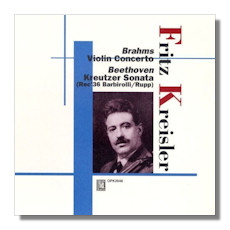
The Internet's Premier Classical Music Source
Related Links
-
Beethoven Reviews
Brahms Reviews - Latest Reviews
- More Reviews
-
By Composer
-
Collections
DVD & Blu-ray
Books
Concert Reviews
Articles/Interviews
Software
Audio
Search Amazon
Recommended Links
Site News
 CD Review
CD Review
Fritz Kreisler Plays

- Johannes Brahms: Violin Concerto in D Major, Op. 77
- Ludwig van Beethoven: Violin Sonata #9 in A Major, Op. 17 "Kreutzer" *
Fritz Kreisler, violin
* Franz Rupp, piano
London Philharmonic Orchestra/John Barbirolli
Opus Kura OPK2048 Monaural
Fritz Kreisler's 1936 Brahms Concerto shares many of the same virtues and weakness of his Beethoven Concerto from the same year with these same forces. Also like the Beethoven Op. 61, Kreisler recorded the Brahms Op. 77 earlier with Leo Blech and the Berlin State Opera Orchestra. I prefer this latter account for a number of reasons, and Opus Kura provides fine sound for us to hear why.
By 1936, there was significant improvement in recording technologies, and the effects are clearly apparent in the present recording. The London Philharmonic sounds fuller and warmer than their Berlin counterparts. They are also an infinitely more appealing bunch, tonally speaking. Nor does Leo Blech compare favorably to John Barbirolli, then or now. Aided by superior support, I find Kreisler's reading of the solo part to be – while not significantly different in terms of interpretation – more engaging on the whole. And while I find Kreisler's later Beethoven Concerto less technically assured, I detect the opposite in Brahms. The 1936 account of the Finale is notably less lumpy and you could even call the earlier one almost labored. Barbirolli is a big reason this later account is better; while the London Philharmonic Orchestra won't win any prizes here on account of beauty, they play leagues around Blech in 1927. In terms of weakness, the 1927 account does (as with the earlier Beethoven) find the legendary violinist to possess a fuller, slightly more alluring tone. However, I suspect this later version will be the one of choice.
Franz Rupp was the accompanist of choice for the violinists' set of Beethoven Sonatas, also from 1936. The congenial partnership between the two is as appealing now as it was then. Curiously, I find Rupp's piano better recorded here than his appearance on OPK2047, though Kreisler still takes center stage. Again, we as music lovers can easily lament that the man's tone was not what it once was when he chose to record this canon, but we can't be anything but thankful these recordings exist at all. Just like OPK2047, this is a must for violin buffs.
Copyright © 2014, Brian Wigman



















